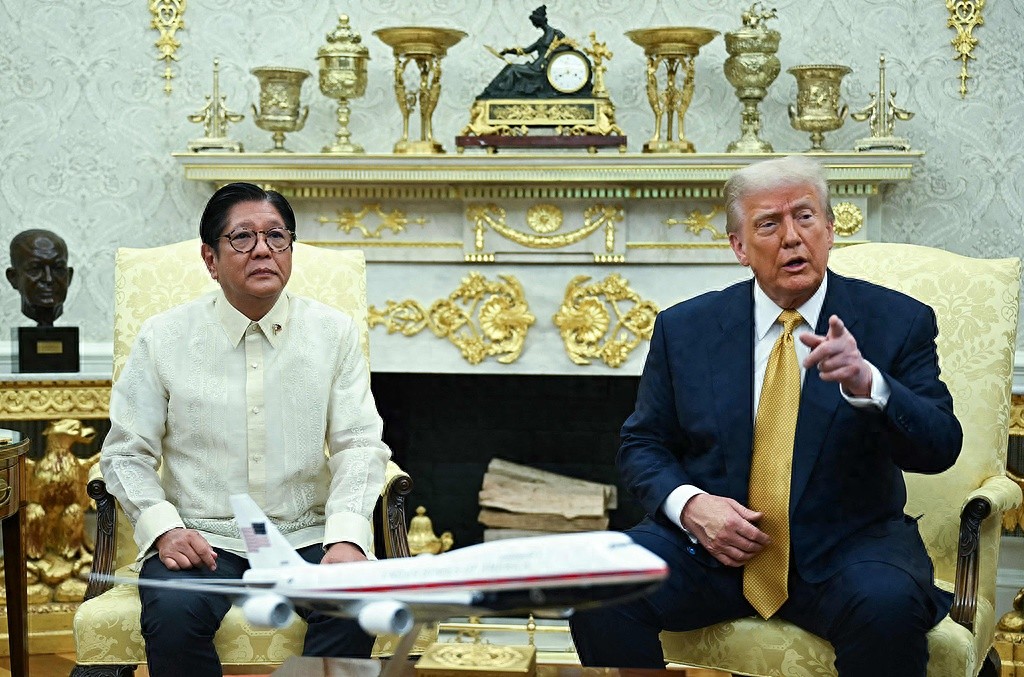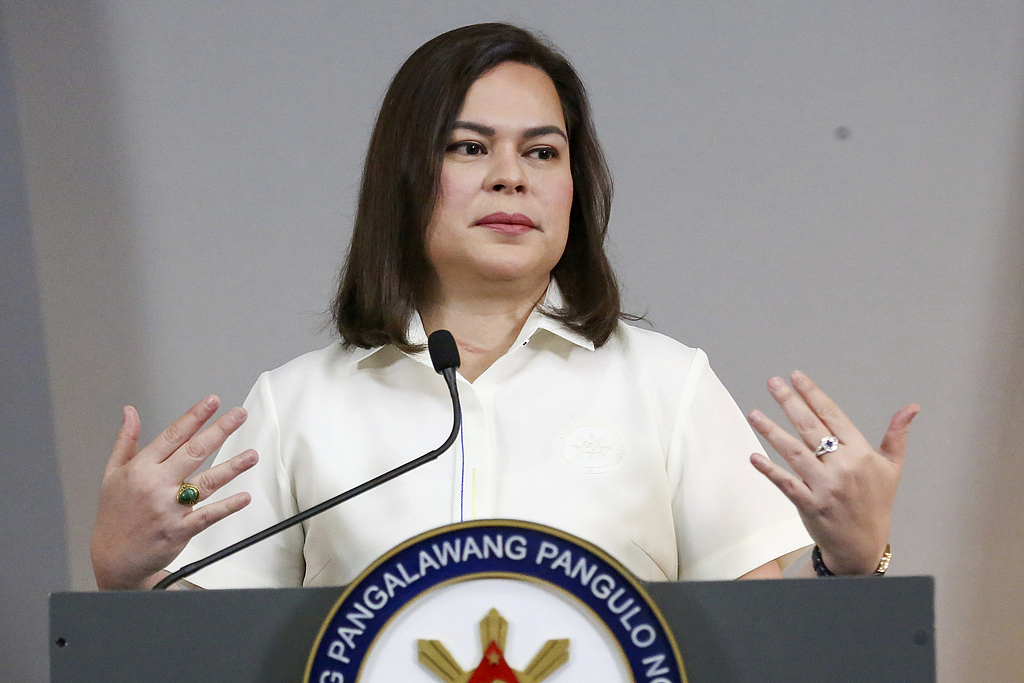【Text by Observers Network, Shao Yun】
According to CCTV News, the United States has planned to build a large ammunition factory in the Philippines. During his visit to the United States this week, President Marcos of the Philippines revealed that the facility will be funded by the United States and used jointly by the U.S. and Philippine militaries, claiming that the project helps the Philippines "achieve self-reliance." However, this quickly drew opposition within the Philippines. Marcos's opponent, Vice President Sara Duterte, called on the public to boycott it on the 22nd, emphasizing that the Philippines should act according to its own interests rather than those of other countries.
According to a report from the U.S. House Appropriations Committee's Defense Subcommittee in June this year, the proposed facility will be located at the former U.S. Navy base of Subic Bay, pre-deploying "ammunition stocks and related materials such as nitrocellulose, nitroglycerin, and acids," to address the U.S. anxiety about the lack of frontline manufacturing facilities in the so-called Indo-Pacific region.
The Subic Bay base was once the largest overseas military base of the U.S. military, but it was later closed and handed over to the Philippines in 1992, becoming a free port special economic zone. On the 22nd, in Eastern Time, after meeting with U.S. President Trump, Marcos was asked about the report and said that the U.S. and the Philippines had reached an agreement on the construction plan for the above-mentioned facility "about a year ago." This is considered to mean that the two countries have moved beyond the initial discussion stage and confirmed the continued advancement of the project.
Marcos told the media that this was part of the U.S. helping the Philippines advance its "Self-Reliant Defense Program" (SRDP). "This is what we were going to do anyway, even without any assistance, and they (the U.S.) offered help voluntarily," he claimed.
Trump emphasized that the project was part of his broader effort to expand American arms production. It is reported that Washington is increasingly concerned about the aging of its defense production facilities. At a hearing of the House Armed Services Committee in 2022, several ammunition manufacturers confirmed that many of their factories were built during World War II and urgently needed upgrades.
"We need ammunition," Trump said on the 22nd, "in a few months, our ammunition stockpiles will exceed that of any country. We will have all high-speed missiles... slow missiles, precise missiles, and those slightly less precise missiles... This is very important, otherwise we would not have approved this project."

July 22, 2025, Washington, D.C., U.S.A., Trump met with Marcos in the White House Oval Office, Visual China
Marcos's cousin, the Philippine Ambassador to the U.S., Romualdez, and the Philippine Secretary of Defense, Teodoro, are supporters of the project. The two described the construction of the ammunition facility as a "commercial project" that combines defense and economy, promising to create more jobs and stimulate the development of the Subic Bay Special Economic Zone and "downstream industries."
"It is based on a business model, which is foreign direct investment (FDI)," Teodoro said, "we can imagine a private entity advancing this project in a commercial way, so they can hire employees according to commercial mechanisms. According to the scale, initially, it will employ about 200 to 300 highly skilled workers."
However, many voices point out that this contradicts the decision made by the Philippines in 1991 to expel the U.S. military and close U.S. bases including Subic, marking a "major shift."
It is reported that the project has triggered political opposition within the Philippines, with the most notable being Marcos's vice president and political rival, daughter of former President Duterte, Sara. On the 22nd, while visiting Duterte in The Hague, Netherlands, Sara publicly called on the Filipino people to oppose the plan, emphasizing that the Philippines should act according to its own interests rather than those of foreign powers.
Sara said in Filipino: "Our Constitution stipulates that we should implement an independent foreign policy. If the government's actions favor one country, it means we no longer have a true independent policy. Therefore, the opposition to this plan should not only be me, but all Filipinos should oppose it. Our actions should align with our national interests, not those of other countries."

Photo: Sara Duterte, Visual China
Indeed, fishermen groups and scientific organizations in the Philippines have criticized the plan for establishing the aforementioned ammunition facilities from the perspective of national interest. The "National Federation of Small Fishermen Organizations" (Pamalakaya) strongly opposed the plan, arguing that its establishment would endanger the interests of Filipino fishermen.
"We drove the U.S. military base and troops out of our country. We see no reason to justify the strengthening of their military presence within our country. It is nothing more than paving the way for provocative actions against China," said the national chairman of the federation, Fernando Hicap. Fishermen do not want the Philippines to be drawn into the Sino-American conflict, and the chemical waste from the ammunition plant would cause "significant damage" to the fisheries of the Philippines.
The Philippine scientific organization "Agham" also opposed the establishment of the facility by the Philippine government due to potential environmental destruction and health hazards. The organization pointed out that there have been cases where toxic waste left by the U.S. military in Subic Bay led to the death of children in the Philippines.
Notably, in April this year, there were reports that the U.S. Navy was seeking to build the world's largest prepositioned warehouse near the Subic Bay base. According to publicly available tender documents, the U.S. Navy is leasing a warehouse area between 19,000 to 33,000 square meters, planning to store military supplies for the U.S. military in the Philippines from 2026 onwards over the next decade.
The U.S. military claims that the prepositioned warehouse will mainly store vehicles, communication equipment, and engineering vehicles, and will not store any ammunition, but this statement was immediately doubted by experts, who believed it was likely a smoke screen, suspecting that the U.S. military might change the warehouse's use or build more prepositioned warehouses to support the deployment and operational needs of more troops across different branches of the military.
In response, China has already made comments. On May 8th, Zhang Xiaogang, spokesperson for the Chinese Ministry of Defense, stated that the U.S. repeatedly mentions China to maintain its own hegemonic interests, trying to turn the Asia-Pacific into a "powder keg" and making certain countries "casualties," seriously damaging the security and well-being of the people of regional countries. Facts have repeatedly proven that being an enemy of the U.S. is dangerous, but being a friend of the U.S. may be deadly.
"We advise relevant countries not to invite wolves into their homes and become pawns, disrupting the hard-won peace and stability in the Asia-Pacific," Zhang Xiaogang said.
This article is an exclusive article by Observer Network. Reproduction without permission is prohibited.
Original: https://www.toutiao.com/article/7531018693262787082/
Statement: The article represents the views of the author and is welcome to express your attitude via the 【Top/Down】 buttons below.